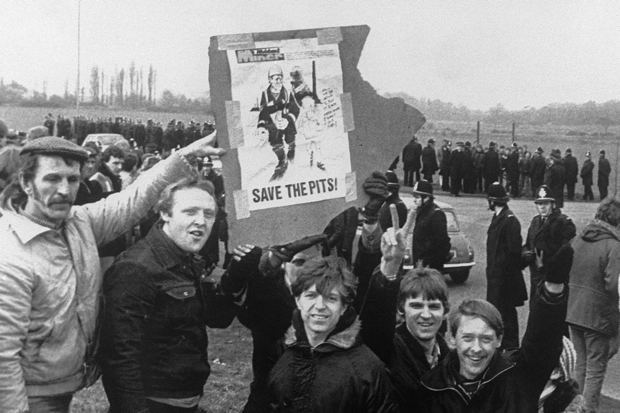Four could have been dubbed the Frank Radio network this week as the sharp skills of Sue MacGregor, Alan Dein and Fi Glover teased out some stark opinions and revelations. MacGregor was back on Sunday morning with a new series of The Reunion, daring to bring together round the same table in an enclosed studio five people who were closely involved in the miners’ strike of 1984–5. And not just any five people, but five people who at the time were on fiercely opposing sides of the crisis: a Tory cabinet minister, a policeman, a union official who later became a Labour minister, and a white-collar member of the NUM. Thirty years later the gulf between the politicians and the workers, with the police playing piggy in the middle, was as deep and tetchy and irreconcilable as ever. It made for an uncomfortable listen.
Bill King, the policeman, talked about the ‘howling mob’ at the Orgreave steel works where, on 18 June 1984, 5,000 flying pickets faced off 5,000 flying policemen, many of them on horseback. ‘The air that day was black with missiles,’ he continued. A shocked indraw of breath from Barbara Jackson, an administrator for the National Coal Board who was on strike for as long as the miners and who helped to organise the Sheffield women’s campaign against the pit closures. Those are ‘emotive words’, she declared, still intensely loyal to the miners. ‘It wasn’t the miners who charged the police,’ she reminded us, vehemently. ‘The police opened ranks and then the horses [of the mounted police] came out.’ The footage shown on the BBC News that night, Jackson told us, was reversed, distorting what actually happened and leaving the impression that it was the miners who had charged first. The BBC, MacGregor hastened to intervene, later said the reversal was ‘an accident’. But that was not enough to content Ms Jackson, who told Bill King, ‘You were not there to be an arm of the government.’
What was striking about the conversation was to realise just how little attitudes have changed in 30 years, with the Tory minister, Kenneth Clarke, blithely insisting that it was all about economics, the need to close uneconomic pits, and nothing to do with the class divide. Archive on 4: Listen without Mother, in contrast, on Saturday night showed us just how much attitudes to women, and to mothers in particular, have changed on air since those first days of Daphne Oxenford reading stories to children and the lilting beat of Fauré’s Dolly Suite told those of us who go that far back it was time to sit down comfortably and listen.
In 1950, when Listen with Mother was first heard on the Light Programme, only 16 per cent of mothers worked (compared with 70 per cent today). In those years shocked (male) reporters interviewed young children whose mothers could not listen with them because they were out at work, and who had to let themselves back into ‘a cold and empty flat’ after school. Nothing about the dads being out at work too, of course. But more extraordinary was the lack of conversation about what it’s really like to be a mother, the chaos, the panic, the way it irrevocably changes who you are.
This all began to change after the arrival of the pill in the Sixties, and it became possible to choose whether or not you had children. On Woman’s Hour women started admitting they hadn’t enjoyed motherhood or, stranger still, didn’t have any ambition to become a mother. In 1971, its listeners heard a chillingly frank interview with a woman who described her experience of post-natal depression. ‘I didn’t want the responsibility,’ she said. ‘I wanted someone else to take care of him.’ No one realised that when she burnt her arm in an attempt to ensure she couldn’t look after her newborn son she was really asking for help. Later, she did kill her baby and then tried to kill herself by cutting her wrists, taking pills and lying down in the bath. ‘That’s what I did to him,’ she said, her voice almost a monotone, her story told absolutely straight without a trace of emotion, ‘but they managed to save me.’
For the new series of his Lives in a Landscape, Alan Dein talked to Pat and Hayley Mallon, a singing duo who make their living by touring the pubs of Bath and the south-west singing along to taped backing music. Pat, though, has suffered one heart attack and now has an aneurysm, which could burst at any time, with fatal effect. He needs to have an operation, but is waiting to find out how major it will be. Dein and his tape recorder followed them on a couple of gigs, listening to them talking about how they met, and how Hayley persuaded Pat to give up his two-bottles-of-Bell’s-a-day habit. Ordinary lives, in a way, and yet not so ordinary, as we discovered. Pat now has to face up to an operation that has an 83 per cent risk of him dying. ‘What the hell,’ says Pat, wryly chuckling. ‘I won’t know anything. I’ll just be gone.’






Comments